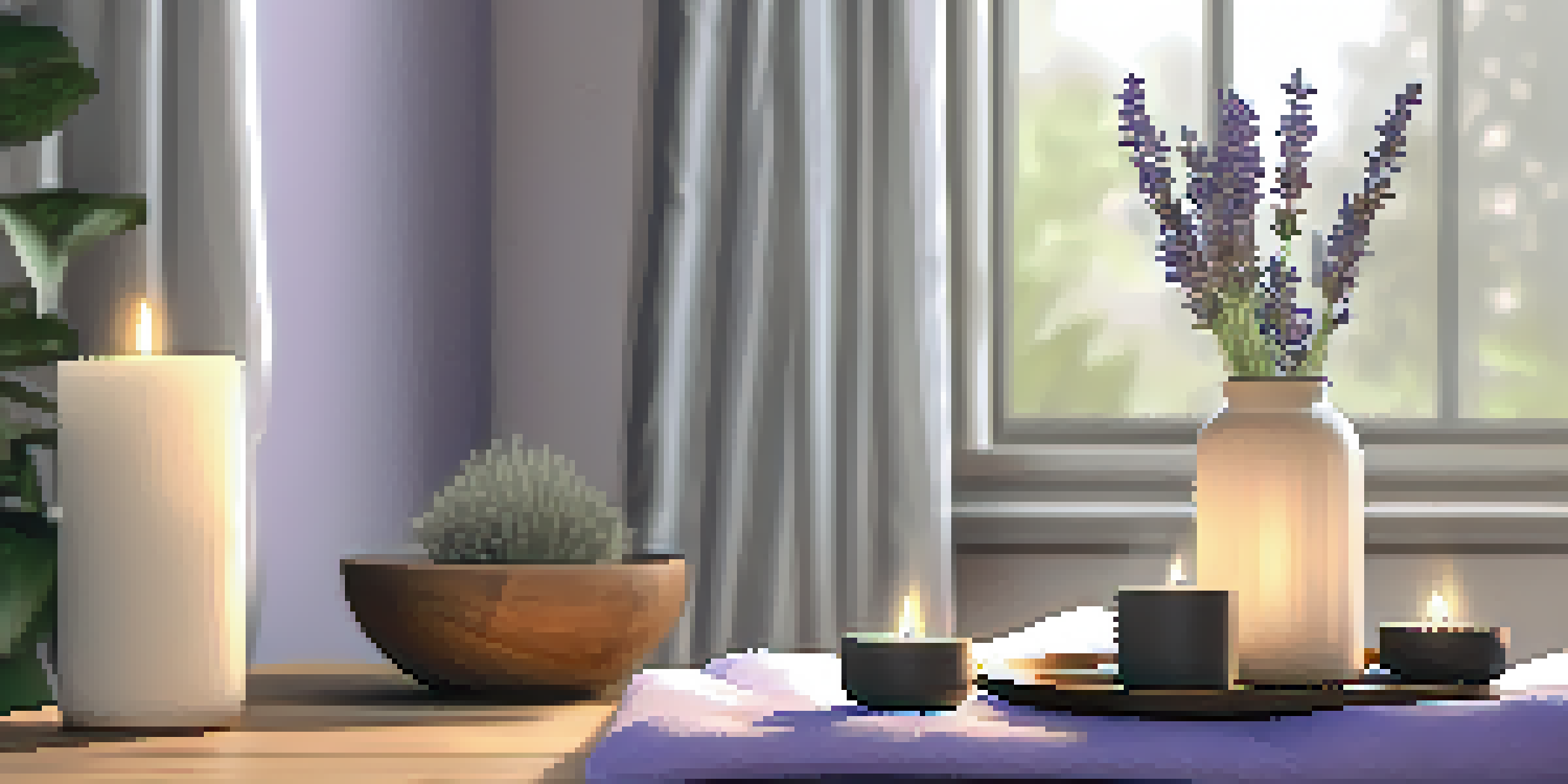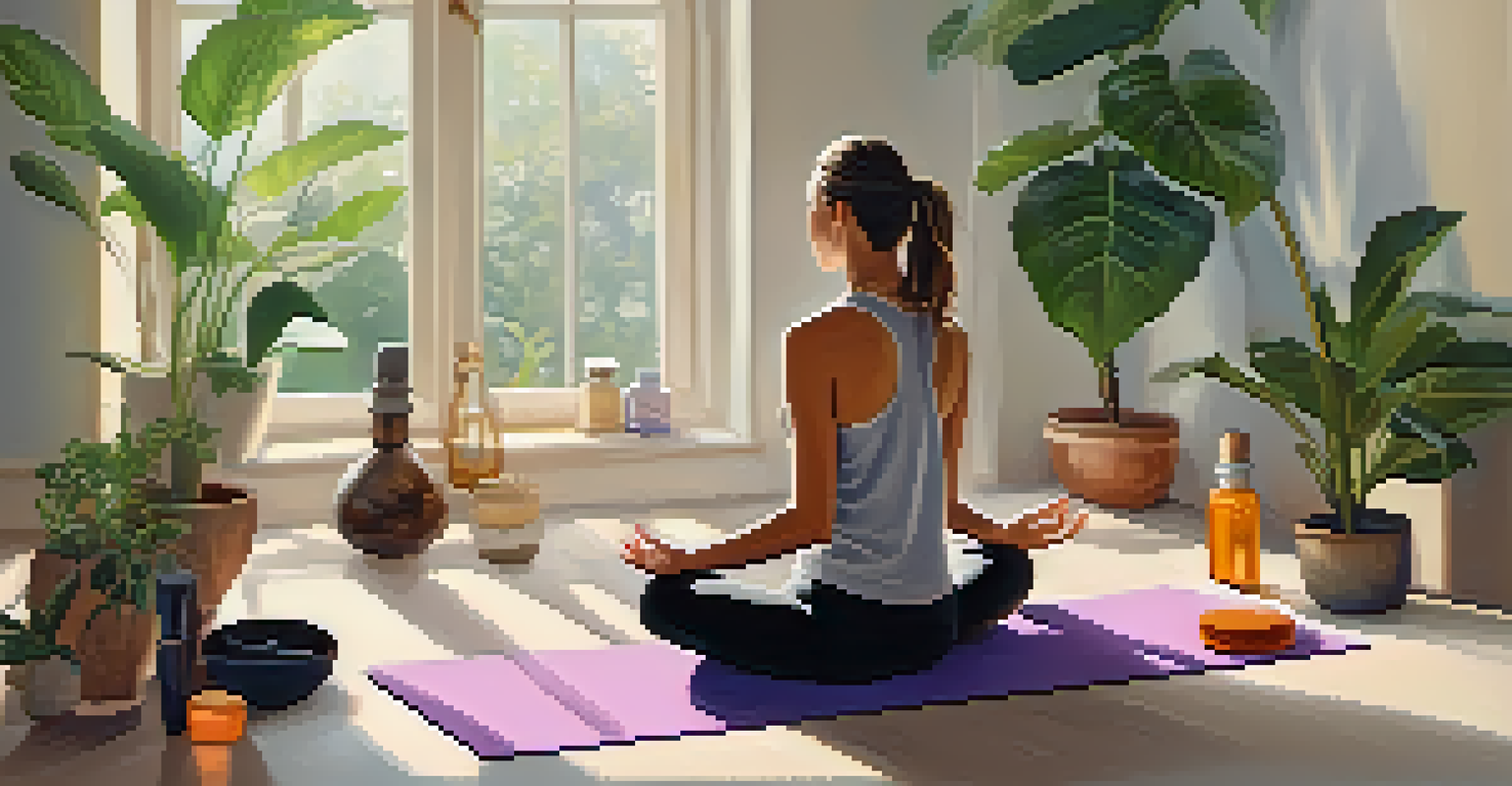Essential Oils for Stress Relief: Blending for Optimal Relaxation

Understanding Stress and Its Impact on Well-Being
Stress is a common experience that can affect your physical and mental health. It can arise from various sources, such as work pressure, personal relationships, or financial worries. When stress becomes overwhelming, it can lead to anxiety, fatigue, and even chronic health issues.
Stress is not what happens to us. It's how we react to it.
Many people seek effective ways to manage stress, and one increasingly popular method is through the use of essential oils. These concentrated plant extracts can promote relaxation and create a calming atmosphere, making them a great natural alternative to pharmaceuticals.
By integrating essential oils into your daily routine, you can cultivate a more relaxed state of mind. It's essential to understand how specific oils work to choose the right ones for your stress relief needs.
Popular Essential Oils for Stress Relief
Several essential oils are renowned for their calming properties. Lavender oil, for example, is often praised for its soothing effects and is frequently used to promote restful sleep. Similarly, chamomile oil has been shown to reduce anxiety and help with relaxation.

Bergamot oil, extracted from citrus fruit, is another excellent choice. Its uplifting scent can help alleviate feelings of stress and improve mood. Other oils, such as frankincense and ylang-ylang, also contribute to a sense of calm and emotional balance.
Stress Affects Health
Stress can significantly impact both physical and mental well-being, leading to issues like anxiety and chronic health problems.
Choosing the right essential oils is essential for effective stress relief. Each oil has its unique properties, so experimenting with different ones can help you find your personal favorites.
How to Use Essential Oils for Stress Relief
There are numerous ways to incorporate essential oils into your stress management routine. One popular method is through aromatherapy, where you can diffuse oils in your home or office to create a calming environment. Simply add a few drops of your chosen oil to a diffuser filled with water, and let the gentle mist fill the air.
The mind is everything. What you think you become.
Another option is to create your own personal inhaler by adding a few drops of essential oil to a cotton ball and placing it in a small container. This way, you can take it with you and inhale whenever you feel stressed throughout the day.
Topical application is also an effective method. Diluting essential oils with a carrier oil, like jojoba or coconut oil, allows you to apply them directly to pulse points, such as wrists or behind the ears, for a quick pick-me-up.
Creating Your Own Essential Oil Blends
Blending essential oils can enhance their stress-relieving properties and create a personalized experience. Start by choosing a base oil, such as lavender or chamomile, and then add complementary oils that resonate with you. For example, combining lavender with bergamot can create a soothing yet uplifting blend.
When blending, consider the ratios: a good starting point is three drops of the base oil to one drop of each complementary oil. Experiment with different combinations until you discover a blend that truly soothes your mind and body.
Essential Oils for Relaxation
Essential oils, such as lavender and bergamot, offer natural stress relief by promoting relaxation and emotional balance.
Don't forget to keep track of your creations! Jot down your favorite blends and their effects, so you can duplicate them in the future whenever stress strikes.
Safety Tips for Using Essential Oils
While essential oils offer many benefits, it's essential to use them safely. Always dilute oils with a carrier oil before applying them to your skin to prevent irritation. For most oils, a 2-3% dilution is recommended, which translates to about 12 drops of essential oil per ounce of carrier oil.
Some essential oils are not suitable for everyone, especially pregnant women, young children, or those with certain medical conditions. Always consult with a healthcare professional if you're unsure about using specific oils.
Additionally, perform a patch test by applying a small amount of diluted oil to your skin to check for any adverse reactions before using it more broadly.
Integrating Essential Oils into Your Daily Routine
Incorporating essential oils into your daily life doesn't have to be complicated. Start by establishing a calming ritual, such as diffusing oils while you read, meditate, or take a bath. This can create a peaceful atmosphere that signals your mind and body to relax.
You can also use essential oils during stressful moments. For instance, when you feel overwhelmed at work, take a moment to inhale your favorite oil from an inhaler or apply it to your wrists. This small act can help ground you and ease tension.
Safe Use of Essential Oils
To safely enjoy the benefits of essential oils, it's important to dilute them properly and consider individual health conditions.
Over time, these practices can become comforting habits that contribute to your overall well-being and resilience against stress.
The Holistic Benefits of Essential Oils
Using essential oils for stress relief goes beyond just calming the mind. Many oils possess various health benefits, including anti-inflammatory, antimicrobial, and mood-enhancing properties. This holistic approach can lead to improved physical health and emotional balance.
In addition to stress relief, many people find that essential oils can enhance their sleep quality, boost their mood, and even aid in better focus and concentration. This makes them a valuable addition to any wellness routine.

By embracing the power of essential oils, you not only address stress but also support your overall health and well-being in a natural, approachable way.